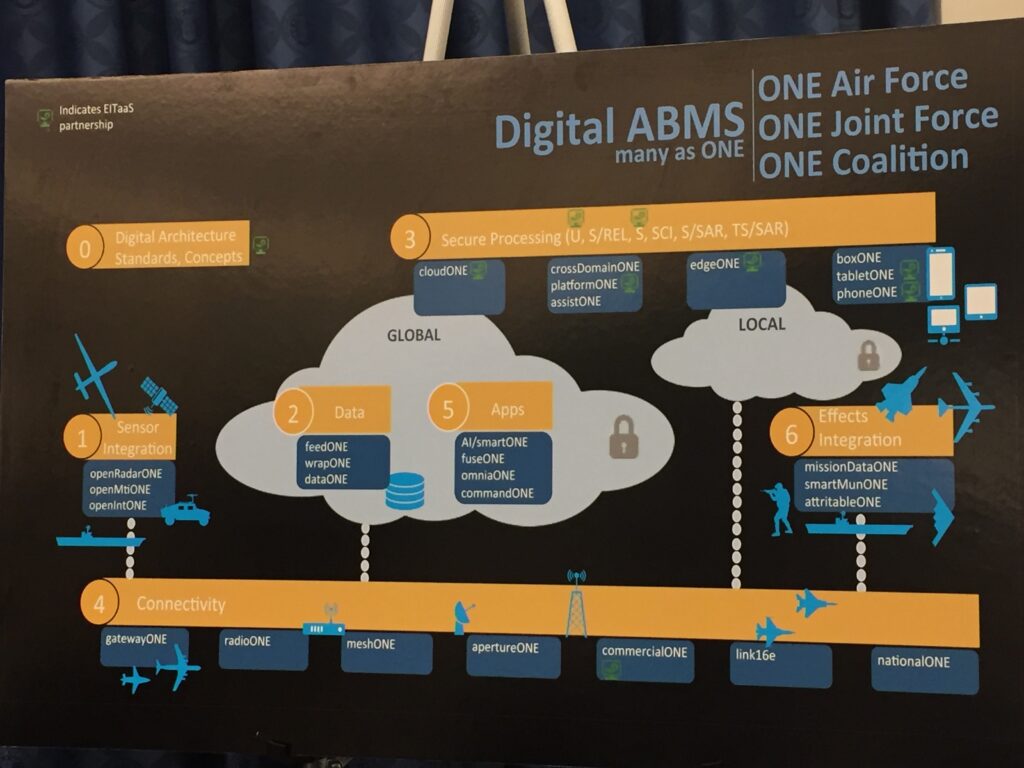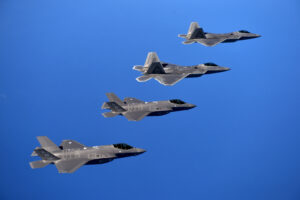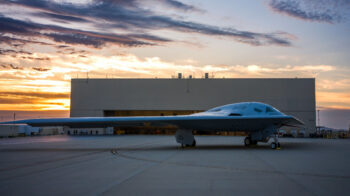
Advanced Battle Management System Overview
UPDATED TO INCLUDE AIR FORCE COMMENTS; CLARIFICATION ON FUNDS
WASHINGTON: UPDATE BEGINS. The Air Force has chosen from 28 firms, some behemoth defense contractors and others are Silicon Valley startups, to compete for tech awards of up to $950 million eachover the next five years to support its ambitious Advanced Battle Management System (ABMS) for future joint all-domain operations.
While technically, any one of the vendors could receive an award of $950 million, that does not mean that all of them could receive that maximum amount — resulting in some $27 billion in awards, an Air Force spokesperson explained this evening. Neither does the $950 million represent a total “pot” of available for funding for which all 28 are competing.
Rather, the limit on Air Force spending for ABMS is the currently approved budget of $3.3 billion over the next five years. Nor does the service expect to have see the ABMS budget jump quite as high as to equal $27 billion in the five-year budget planning cycle starting in 2022.
The $950 million was set as a “ceiling” for any one vendor as a method of giving the Air Force the greatest possible flexibility in how it doles out the ABMS funds, as vendors are able to demonstrate the workability and applicability of their offerings to the overarching ABMS architecture, the spokesperson said.
UPDATE ENDS.
The funds will be made available in “indefinite-delivery, indefinite quantity” (IDIQ) contracts, which means it is unclear how much will go to any one of the vendors for what technology. Rather, the macro-contract allows those firms to pitch the Air Force their wares and the service to make snap — well, snappish — decisions once a technology is demonstrated.
“All an IDIQ is is a hunting license to sell to the US,” explains defense industry guru Bill Greenwalt. He said that the benefit is that acquisition under IDIQs can be processed much faster than the average two-year timeframe it takes to negotiate most DoD contracts. How it works, Greenwalt added, is that individual task orders are issued” under the contract that then take a few weeks to process — depending on the individual deal underway.
“Regardless, it is light years faster than starting from scratch each time,” he said.
UPDATE BEGINS
“This IDIQ is part of a multi-prong innovative ABMS “contract lattice” strategy to enable an agile DevOps approach to software and hardware development,” Preston Dunlap, Air Force Chief Architect who is managing the ABMS program, told Breaking D in an email statement.
The primary objective, he explained, is “to enable more rapid competition for tasks” to support “the agile DevOps acquisition approach for ABMS development.” This, he added, “allows competition to occur in as little as every four months based on the technical and operational learning that occurs, leading up to and during the ABMS Combatant Commander Onramps and ongoing experimentation.”
Dunlap explained that the IDIQ award “is divided into each of the major ABMS Product Categories: Digital Architecture, Engineering and Concepts; Sensor Integration; All-Domain Data; All-Domain Secure Processing; All-Domain Connectivity; All-Domain Applications; and Effects Integration.”
The minimum award for each of the 28 firms chosen is $1,000, he said. According to a chart provided to Breaking D, some companies, such as Lockheed Martin, are competing in all the categories; others, such as data analytics startup Palantir, are competing in only a few.
This contract was awarded in 91 days in response to the Broad Agency Announcement (BAA) release in February 2020, Dunlap added. “The second IDIQ onboarding round recently closed with additional awards expected in the coming months,” he said, and submissions for a third contract closes on Aug. 31.
As Breaking D readers know, ABMS is the Air Force’s central effort to support JADC2. According to the Dunlap, “ABMS is the Air and Space Force ‘internet of military things’ in support of Joint All-Domain Command and Control (JADC2) to move from merely de-conflicting operations to true integration of operations that presents multiple dilemmas to potential adversaries.”
UPDATE ENDS
“The recently announced $950 million indefinite-delivery/indefinite quantity contract award enables Northrop Grumman — as one of 28 awardees selected for the IDIQ contracting vehicle — to continue to work closely with the United States Air Force on all seven Advanced Battle Management System (ABMS) categories,” Bryan Lima, MDC2 director for the firm, told Breaking D in a June 2 email. “Through this effort, Northrop Grumman will bring our expertise in each category to support USAF’s ABMS vision and Joint All-Domain Command and Control (JADC2) needs across DOD.”
A Lockheed Martin spokesperson similarly said that the company is delighted “to receive an indefinite-delivery/indefinite-quantity (ID/IQ) contract notification from the Air Force Life Cycle Management Center in all seven Advanced Battle Management System (ABMS) categories.”
“The initial effort for this contract is a meeting to provide the government with additional information about where Lockheed Martin can contribute to the ABMS architecture and capabilities. This first engagement is scheduled for June-July 2020,” the spokesperson added in a June 2 email.

Two F-22s and two F-35s fly in close formation.
Northrop Grumman and Lockheed Martin, along with another awardee Honeywell Aerospace, already have been involved in the Air Force’s ongoing “On-Ramp” exercises for ABMS. The three companies in December demonstrated the “gatewayONE” — essentially a radio and antenna system — that allowed Navy and Air Force F-35 Joint Strike Fighters to exchange data with F-22 Raptors with a low probability of detection.
According to a spokesperson for BAE Systems, “the contracts are ID/IQ with individual task orders determining specific scope and schedule. BAE Systems’ response covers all seven categories of the Advanced Battle Management System.”
“This includes cross-domain digital engineering architecture, interoperable sensors, fusion of distributed sensor data, data repositories, enterprise IT, distributed multi-level security cloud, data processing and dissemination, artificial intelligence and machine learning, multi-source and multi-INT data feed apps tailored to solve complex multi-domain Command and Control challenges, and integration of networked weapons,” the BAE spokesperson added.
“Boeing is ready to support the U.S. Air Force’s future Joint All Domain Command and Control vision,” said Jeff Shockey, vice president, Global Sales and Marketing, in a June 2 statement provided to Breaking D. “We look forward to partnering with the USAF to develop and deploy technologies that enable battlefield decision making in an increasingly complex threat environment.”
Other vendors included in the award are: Alion Science and Technology; Apogee Research; World Wide Technology; Borsetta; CACI; Chooch Intelligence Technologies; Collins Aerospace Co.; Dell Technologies; Fregata Systems; General Dynamics; Hellebore Consulting Group; Immersive Wisdom; L3 Harris; Parsons Government Services; Persistent Systems Raytheon; Securboration; Silvus Technologies; Simple Sense; Solid State Scientific; Viasat; and Wind Talker Innovations.
China’s new H-20 stealth bomber ‘not really’ a concern for Pentagon, says intel official
“The thing with the H-20 is when you actually look at the system design, it’s probably nowhere near as good as US LO [low observable] platforms, particularly more advanced ones that we have coming down,” said a DoD intelligence official.


























